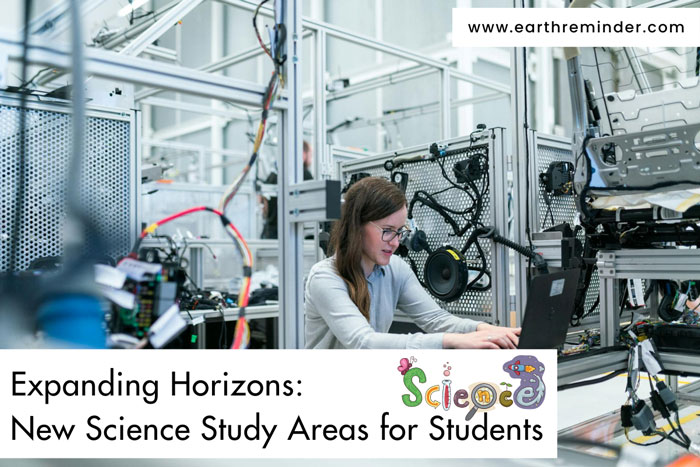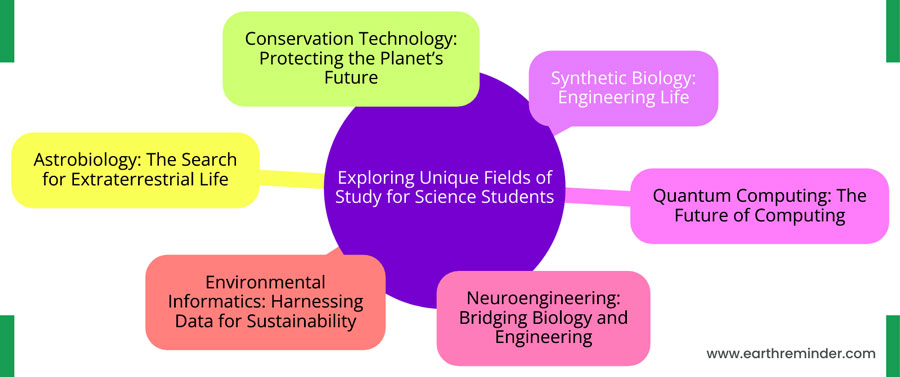There are different and exciting science subjects that go beyond regular lab work. This is about discovering areas like studying life in space and using new technology to help the environment. It’s a journey into science that shows you more ways to learn and make a difference in the world. Here, we will see new science study areas for students.
Table of Contents
- 1 Exploring Unique Fields of Study for Science Students
- 1.1 Astrobiology: The Search for Extraterrestrial Life
- 1.2 Conservation Technology: Protecting the Planet’s Future
- 1.3 Synthetic Biology: Engineering Life
- 1.4 Quantum Computing: The Future of Computing
- 1.5 Neuroengineering: Bridging Biology and Engineering
- 1.6 Environmental Informatics: Harnessing Data for Sustainability
- 2 Conclusion
Exploring Unique Fields of Study for Science Students
The realm of science education is vast and filled with endless possibilities, offering more than just the traditional paths of biology, chemistry, and physics. For the aspiring science student, the academic journey can venture into unique and specialized fields, each with its distinct challenges, opportunities, and rewards. These specialized areas of study not only promise an intriguing educational experience but also the chance to make significant contributions to our understanding of the world and beyond.
While managing the demands of these innovative courses, students often seek academic support to ensure they can fully immerse themselves in their field of interest. By integrating such support, students can navigate their academic responsibilities while delving into the depths of unique scientific disciplines.
Astrobiology: The Search for Extraterrestrial Life
Astrobiology is an attractive interdisciplinary field that lies at the intersection of astronomy, biology, and geology, offering students an unparalleled opportunity to explore the enigmatic question of life beyond Earth. This field thoroughly investigates the origins, evolution, distribution, and future of life in the universe, making use of principles from various scientific disciplines. Students engage in the study of extremophiles on Earth to better understand the potential for life in extreme environments on other planets, actively contributing to missions aimed at uncovering signs of life on Mars, Europa, and other celestial bodies. The pursuit of knowledge in astrobiology not only fuels the imagination but also strengthens the scientific foundation for future space exploration and the potential discovery of extraterrestrial life.
Conservation Technology: Protecting the Planet’s Future
Conservation technology represents an innovative and emerging field dedicated to leveraging the latest tools and technologies to confront and mitigate pressing environmental challenges. Within this discipline, students are immersed in the development and application of cutting-edge techniques such as remote sensing, bioacoustics, and drone technology. These tools are pivotal in monitoring biodiversity, combating poaching, and managing natural resources with unprecedented efficiency and effectiveness. Engaging in conservation technology, students find themselves at the vanguard of devising and implementing solutions that not only preserve but actively enhance ecosystems and wildlife, seamlessly blending their technological prowess with a deep commitment to environmental conservation. For students seeking assistance in articulating their experiences and insights into this transformative field through essays, DoMyEssay.com writes essays for you, offering a platform to convey the significance of their work and research effectively.
Synthetic Biology: Engineering Life
Synthetic biology is at the forefront of scientific innovation, merging the principles of biology, engineering, and computer science to fundamentally redesign or craft entirely new forms of life. Within this revolutionary field, students are given the tools and knowledge to engineer synthetic organisms capable of producing biofuels, detoxifying pollutants, or synthesizing pharmaceuticals. The potential for transformative contributions to science and technology through synthetic biology is immense, offering students a platform to engage in pioneering research that could dramatically alter the landscapes of healthcare, renewable energy, and environmental restoration, pushing the boundaries of what is biologically and ecologically possible.
Quantum Computing: The Future of Computing
Quantum computing is a groundbreaking interdisciplinary field that applies the enigmatic principles of quantum mechanics to forge computing systems of unparalleled processing power. This domain offers science students a profound exploration of complex quantum theories and their application in addressing computational challenges far beyond the reach of traditional computing paradigms. The potential applications of quantum computing are vast and varied, encompassing fields such as cryptography, pharmaceutical development, and climate simulation. Engaging with quantum computing provides students with a unique amalgamation of physics, mathematics, and computer science, positioning them at the cutting edge of technological innovation and computational theory.
Neuroengineering: Bridging Biology and Engineering
Neuroengineering is an exciting domain where the fields of engineering and neuroscience converge, with the ambitious goal of understanding, repairing, replacing, or enhancing the capabilities of neural systems. Students in this avant-garde discipline work on the development of brain-computer interfaces, neural prosthetics, and advanced technologies for brain mapping and stimulation. The prospects for neuroengineering to revolutionize the treatment of neurological disorders and expand human cognitive and physical capacities are extraordinary. This field offers a rich tapestry of challenges and opportunities for students passionate about the nexus of biology and technology, heralding a new era of medical innovation and human-machine integration.
Environmental Informatics: Harnessing Data for Sustainability
Environmental Informatics is a dynamic field that marries the power of information technology with environmental science to tackle some of the planet’s most pressing ecological issues. In this discipline, students learn to collect, analyze, and interpret large datasets related to climate change, pollution, conservation, and sustainable development. By employing tools such as Geographic Information Systems (GIS), remote sensing, and data analytics, they can uncover patterns and trends that inform better environmental decision-making and policy development. This field is ideal for students passionate about sustainability who also have a knack for data science and technology. Through Environmental Informatics, students have the unique opportunity to directly influence environmental policy and practices, contributing to the creation of a more sustainable future by leveraging the vast amounts of data generated in our interactions with the natural world.
Conclusion
The world of science education extends far beyond traditional boundaries, inviting students to explore unique and specialized fields that promise not only fascinating academic and research opportunities but also the potential to make meaningful contributions to society. From the depths of space to the intricacies of the human brain, these disciplines offer a rich tapestry of knowledge and discovery. As science students embark on these paths, supported by academic writing services and fueled by their passion and curiosity, they open the door to a future where their work can truly make a difference. The adventure into these unique fields of study is not just an educational choice but a journey toward becoming pioneers in the science of tomorrow.

